In residential landscaping, a swimming pool is a temporary or permanent structure built indoors or outdoors with the intended purpose of holding water. This allows the user to be able to swim, bathe, play, exercise, or relax in this structure.
Swimming pools are an awesome addition to any home. They can serve as a great spot for retreat, a play zone for the family, and a training area for serious swimmers or swimming enthusiasts. But installing a swimming pool is a very delicate task as they come in different sizes and styles. Budget, lot size, materials, and area codes are also some factors that might influence your decision on the type of swimming you choose for your home.
To help you out, I have put together a list of some of the best types of swimming pools for residential properties. Each of them comes with its pros, cons, and special considerations that will help you decide which is best for your home. So, without taking too much of your time, let’s dive right into it.
Types of swimming pool
1. Kiddies pool
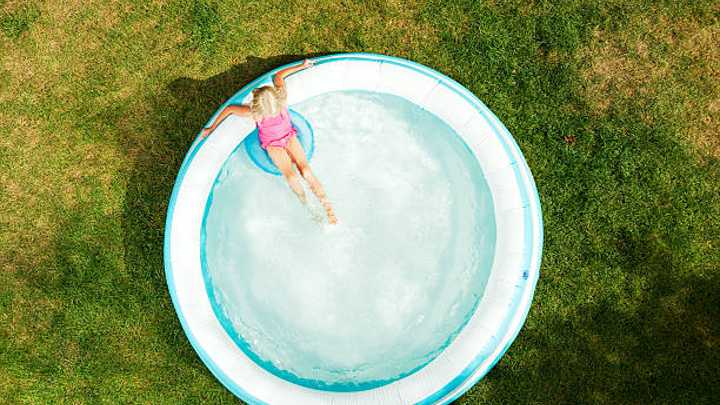
A kiddies pool is the go-to pool for many families who are on a very tight budget. They are made of either an inflatable device or a rigid plastic shell, allowing you and your family to take a dip whenever you want. After usage, you can simply drain out the water and put it back into storage.
Pros
- Very affordable (especially if you purchase at the end of summer when prices are discounted)
- Very portable
- Usage is pretty stress-free
- A portable play feature for children
- Cleaning and maintenance are easy
Cons
- You will have to keep an eye on the kids still as they play (even very shallow pools can be hazardous to unsupervised kids)
- Not as spacious as other types of swimming pool
- Plastic shell versions are prone to breakage
- Not as spacious as other types of swimming pool
2. Above-ground swimming pool
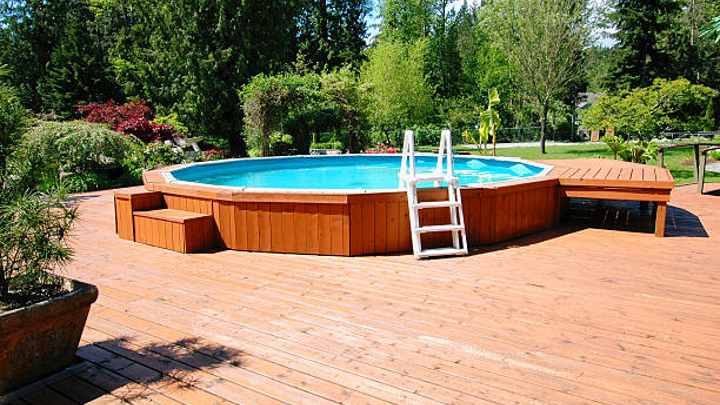
Another common and affordable swimming pool option is the above-ground swimming pool. The main reason it is affordable is because it is not installed beneath the surface, and no excavation is needed during installation. You often find them sitting in the yard with a deck or patio surrounding them, and they are made from aluminum, resin, or steel sidings and vinyl liners.
Pros
- It is one of the most affordable types of swimming pool
- Available in different shapes and sizes
- Some above-ground swimming pools are temporary structures, so you can take them if you move
- No excavation is needed, so installation is very affordable
Cons
- Not very durable
- Not really aesthetically appealing
- Limited designs
- It is a deterrent when trying to sell the property
3. In-ground swimming pool
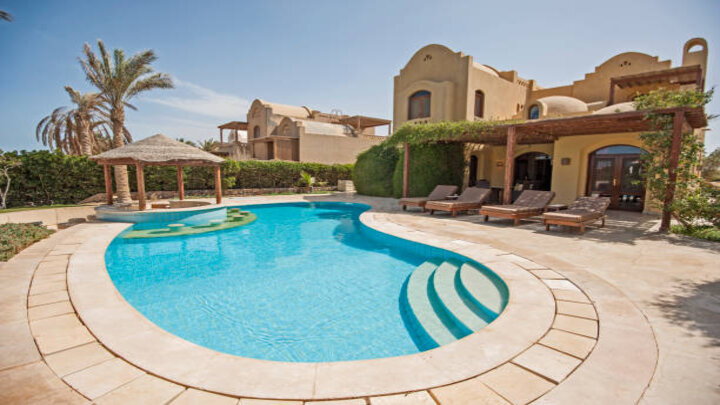
In-ground pools are more like permanent structures built directly into the landscape of the property. They can feature different materials, such as concrete, fiberglass, and vinyl-liners. The material used for this pool will affect its durability, flexibility, and maintenance needs.
Pros
- Different material options are available to choose from
- Adds to the resale value of the home
- Aesthetically appealing
- Customizable
Cons
- Not budget friendly
- High maintenance is needed
- Each material has its own drawback (fiberglass is not customizable, Vinyl can be damaged by animals or falling tree branches, while concrete is very difficult to maintain)
4. Lap pool
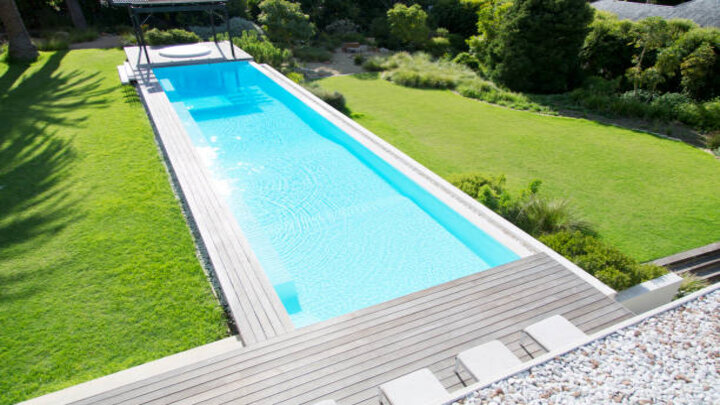
The primary aim of a lap pool is for swimming laps, so if your purpose of having a pool installed is for exercise or fitness, then a lap pool is the right investment for you. They are rectangular in shape and are designed to be very long (typically between 30 to 70 feet long).
Pros
- Great for exercising or swimming enthusiast
- Can be a less expensive option when factoring in yearly maintenance cost
- You do not necessarily need a large lot size to install this type of swimming pool
- Aesthetically appealing
Cons
- Not a good family pool option
- It is not as functional as other pools, as its main purpose is to do laps
- Expensive installation
5. Indoor swimming pool
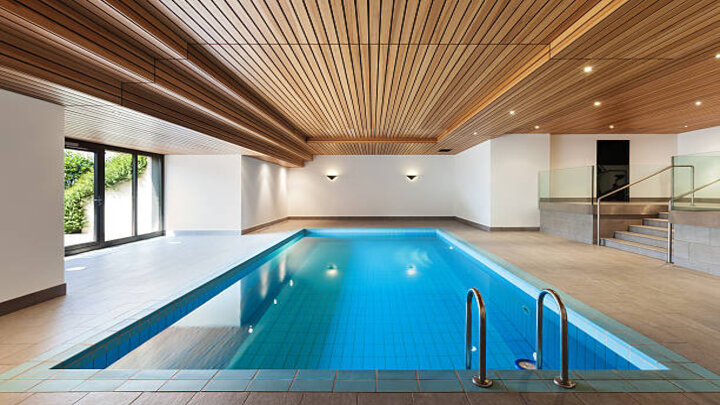
Indoor swimming pools are exactly what they sound like: a swimming pool installed indoors, under the roof, with at least one wall of insulation. In most cases, indoor swimming pools feature an in-ground swimming pool and a constructed glass enclosure that stands as the ceiling.
Pros
- The cost of maintenance is relatively low because the glass enclosure protects the pool from the elements or other kinds of dirt
- You can use the pool 24/7, regardless of the weather
- The water is clearer than the water in other types of swimming pools because debris and dust particles do not come in contact with it
Cons
- Building an indoor swimming pool is not cheap; it requires a lot of finance
- Apart from building the swimming pool, there are other expenses associated with the installation, e.g., lighting, ventilation, temperature regulation, etc
- There is also the case of humidity
6. Infinity pool
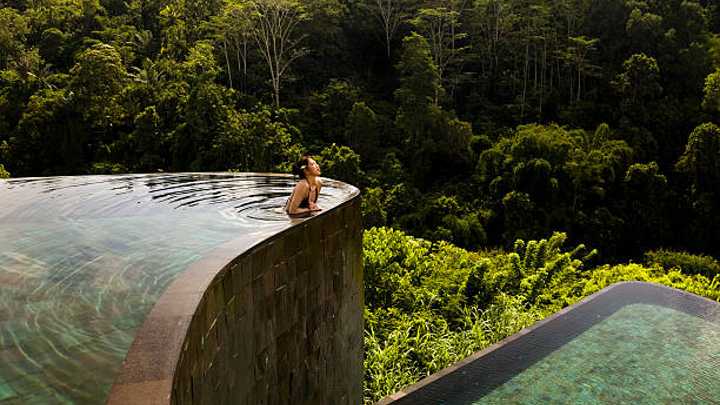
Infinity pool goes by so many names: vanishing edge pools, zero edge pools, negative edge pools, and so on. It is a swimming pool designed to take advantage of the surrounding landscape and highlight a grand view. After installation, an infinity pool will give you an illusion of continuous water dripping off the edge like a waterfall.
Pros
- Very beautiful
- Adds to the resale value of the home
- Versatile, can be used for swimming, exercise, and relaxation
- Infinity pools are built with filtration systems that circulate water constantly; this cuts down algae growth, reducing the maintenance requirements
Cons
- Very expensive installation
- There are safety concerns about this pool, especially for kids and pets
- Not the best option if your property has a sloping landscape
- If your property does not look out onto a larger landscape, the infinity pool might not come out as aesthetically pleasing as it is meant to be
7. Natural pool
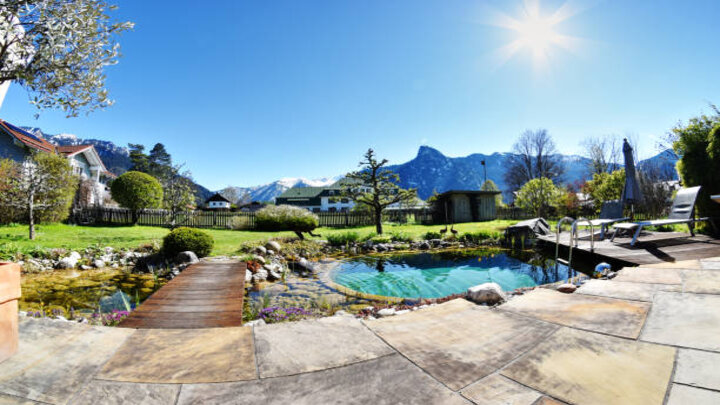
A natural pool, also termed a swimming pond, is a greener alternative to chlorinated swimming pools. They use plants as filters for the water, unlike other types of swimming pools that use chemicals. A natural swimming pool is a great option if you wish to combine water recreation with natural landscape appeal.
Pros
- Environmentally friendly
- Naturally beautiful
- Water is clean naturally through the regeneration zone installed with the pool
- Fairly easy to care for
Cons
- Takes up a lot of space
- Expensive
- Very lengthy installation process
- If the water chemistry is not monitored appropriately, algae overcomes the pool, and recovering will include a whole lot of work
FAQs
What is the most common type of swimming pool?
The in-ground swimming pool is one of the most common types of swimming pool.
Which kind of swimming pool is easiest to maintain?
In terms of maintenance needs, the in-ground fiberglass swimming pool is the easiest to maintain.
Which type of swimming pool is the cheapest?
In-ground vinyl liner swimming pools are very affordable. However, they are very difficult to maintain.
Which type of swimming pool is most aesthetically appealing?
In terms of beauty, the infinity swimming pool and the natural swimming pool offer the most unique and appealing aesthetics.
Choosing the best swimming pool for your residential property
The cost of installing a swimming pool in any residence is very high. On the low end, the kiddie pool can be a very affordable and portable choice for you and your family but tends to be limited in the amount of users and durability. On the high end, infinity and indoor swimming pools will cost more; they are beautiful but will require more maintenance.
As professionals, we advise clients to consider their needs, budget, and available space first. Your need is what you want the pool for, is it for relaxation, exercise purposes, or just for aesthetics? Your budget will also play a huge role in which type of swimming pool that is best suited. Additionally, you should consider the space available for the project, as most pools will eat the bulk of the backyard.
Also, note that you must consider the swimming pool options available to you in that region before commencing your project. Most regions have swimming pool installation guidance that governs pool construction. So, do well to check local building ordinances before you commence your project.
Are you inspired yet? Have a look at our project page and see some of our completed projects, then contact us to get a quote.
Thanks for reading.
1 thought on “Types Of Swimming Pool for Residential Properties”
Comments are closed.